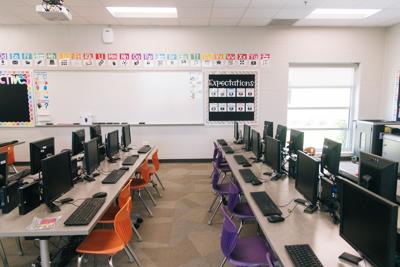Across the nation, COVID-19 relief funding utilized by public schools for the past few years is fizzling out. Now the Metro Nashville Public Schools board is working to ensure that some key initiatives funded by that money will continue — even as the city is facing a flat revenue year. This week saw significant steps in the MNPS budget process as the board voted on a second version of the budget and completed a related hearing with the Metro Council.
Per the budget’s current form, which could change before the council votes on a finalized version in June, the school system would receive around a 3.5 percent increase from last year, adding $41.6 million for a total operating budget of around $1.2 billion. Metro Nashville Public Schools board budget chair Freda Player tells the Scene that this year is “more of a status quo budget.”
The proposed changes include step salary increases ($10.3 million) and a 3.5 percent cost of living adjustment ($22.7 million) for certificated staff, support staff and nutrition services staff. The COLA adjustment wasn’t included in the initial MNPS draft budget, but came after its inclusion in Mayor Freddie O’Connell’s budget proposal. Changes also include a 12.8 percent increase delegated to insurance ($16.4 million). Because of delayed health care due to COVID-19 and what Player calls “some catastrophic claims,” the district’s insurance premiums increased. The mayor also proposed allocating $18 million in one-time funds funds for textbooks. Nearly $7 million would cover contractual inflationary costs.
To address the fiscal cliff from the end of COVID relief money — known as Elementary and Secondary School Emergency Relief funding — the school district needs $77 million in “bridge funding,” which would come from the city and the school district’s reserve funds. Director of Schools Adrienne Battle noted during Thursday’s budget hearing that the amount includes “$66 million from the last budget cycle.” The district is requesting an additional $11 million from the city. While the district used much of the ESSER funds for one-time costs such as building repairs, it also used them to hire more school nurses and counselors and to develop a larger infrastructure to support social and emotional learning among students.
Mayor announces $3.1 billion transportation project has cleared independent audit
“We could be in a very different situation — a lot of our counterparts are, who are facing massive layoffs,” says Player. She says the extra funds will help bridge a longer process of incorporating these positions into the school system.
The school district is also asking the council to fund a pay study around school board members’ salaries, which haven’t been adjusted since 2003. During Thursday’s budget hearing, Player noted that MNPS school board members receive $14,560 per year, while other large school district board members in Tennessee make around $30,000. Additionally, says Player, MNPS school board members often have to pay for state-required professional development out of their own pockets due to limited associated funds.
Some state-level aspects of the budget process are still unknown. MNPS doesn’t typically find out how much money it will receive from the state’s funding formula until around June — at about the same time when the budget needs to be finalized. There may also be some additional one-time ESSER funds coming in from the state due to a disbursement error.






